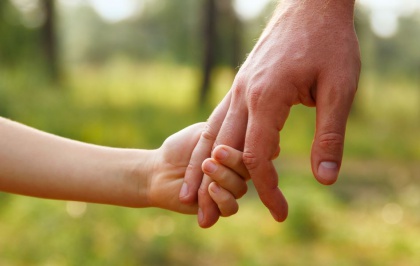Maturity Is When You Don't Need to Blame Others for Your Problems

Remember when you were a child? Childhood is a wonderful period of time, and this is why we sometimes look back with nostalgia. It was a time when we were discovering the world, but at the same time, we felt the security that being cared for by adults provided us.
During childhood, it’s our parents or caretakers who are in charge of protecting us, supplying our needs, and, not least important, making decisions for us. That’s why growing up is a bittersweet experience; we lose a sense of comfort and security, but we gain something infinitely more valuable: freedom.
“There is no problem so bad that a little blame can’t worsen.”
-Bill Watterson-

As the years go by, we slowly start to take the reins of our own lives. The first thing we do is work so that we can take care of our basic needs, but there are other aspects that we also have to learn to be responsible for: our emotional ties, for example, or our mental health.
The difference between growth and maturity lies in the way we manage this responsibility. Time passes relentlessly and we all grow, but the way we take responsibility of our emotions determines how well we’ve matured on top of how well we’ve grown.
Maturity is seeking solutions before seeking blame
Making decisions involves experiencing the emotions related to fear of uncertainty and of making a mistake. Sometimes we get in our own way and we struggle to choose one way or another.
But the truth is that we’re all going to make mistakes, because making mistakes is a part of learning. Do you remember when you were learning how to add in school? At first it was very complicated and you made many errors, but with practice, adding became a basic ability.
Knowing that we’ve made a mistake brings on a complicated process of reflection and analysis, and that’s why sometimes it’s easy to look for external reasons for our mistakes. This is where blame comes into play. Often, when we’re faced with obstacles, our minds work hard to find someone or something to blame.
This happens so much that even when we trip on an inanimate object, we blame it for being in the way. Has that ever happened to you? You’re walking along distractedly and you step on a toy that shouldn’t have been there, hurting yourself in exactly the most painful spot on your foot. Without thinking about it, you hear yourself scolding that damn toy. It’s natural, frustration looks for someone to blame.
But what happens when an obstacle you encounter is something more important than a toy in the middle of the floor? Maybe you failed an exam you thought you were prepared for, or maybe they haven’t renewed your contract at work, or you’re having communication issues with your partner, or your father gets angry with you when you share your opinion.
If we don’t self-reflect, if we get carried away by our emotions, blame will appear like a neon light in our minds. Maybe you blame other people, circumstances, or even yourself. But, stop to think: how does blame help anything?
When we blame others or ourselves for what happens to us, we’re focusing on negative emotions and attitudes. We’re gripped with anger and frustration, sadness and resentment, but it doesn’t get us anywhere. In short, we get unhappier.

However, if we break through these negative emotions and arrive at the other side, we’ll realize that beyond whoever or whatever is to blame, something much more useful exists: taking action that will help us change the situation. If we look for solutions, we’ll be sending ourselves the message that whatever it is that has failed, we can try to fix it and we will work on it.
“Let’s try to be more like the parents of our future than the children of our past.”
-Miguel de Unamuno-
You can surely remember a situation in which something unfair has happened to you. For example, you failed an exam that you thought you did well on. You feel awful as you replay the situation in your head, complaining to yourself about the professor or about yourself. You look for someone to blame.
You feel stuck thinking about it, because it belongs in the past, and the past can’t be changed. Blame blocks our thought process.
But if you change gears and choose to do something about it — like arranging a make-up test, or sitting down to study the themes that you didn’t do well on, or asking for help — your emotions will change. Your frustration will turn into motivation. Maturity is learning to go from the first step to the second.
So the next time something bad happens to you and you find yourself looking for someone to blame, remind yourself that the best you can do for yourself is to try and turn the page. Negative emotions are inevitable, but if we look for solutions instead of someone to blame, at some point we’ll realize that we’ve left those negative emotions behind and we’re advancing towards our goals.
This text is provided for informational purposes only and does not replace consultation with a professional. If in doubt, consult your specialist.








